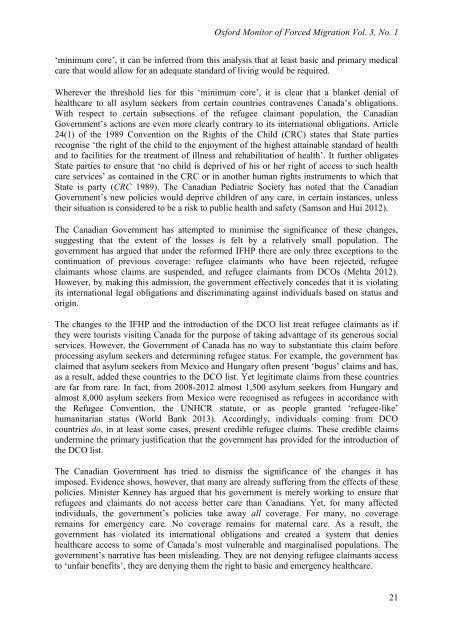OxMo-Vol.-3-No.-1
OxMo-Vol.-3-No.-1
OxMo-Vol.-3-No.-1
Create successful ePaper yourself
Turn your PDF publications into a flip-book with our unique Google optimized e-Paper software.
Oxford Monitor of Forced Migration <strong>Vol</strong>. 3, <strong>No</strong>. 1<br />
‘minimum core’, it can be inferred from this analysis that at least basic and primary medical<br />
care that would allow for an adequate standard of living would be required.<br />
Wherever the threshold lies for this ‘minimum core’, it is clear that a blanket denial of<br />
healthcare to all asylum seekers from certain countries contravenes Canada’s obligations.<br />
With respect to certain subsections of the refugee claimant population, the Canadian<br />
Government’s actions are even more clearly contrary to its international obligations. Article<br />
24(1) of the 1989 Convention on the Rights of the Child (CRC) states that State parties<br />
recognise ‘the right of the child to the enjoyment of the highest attainable standard of health<br />
and to facilities for the treatment of illness and rehabilitation of health’. It further obligates<br />
State parties to ensure that ‘no child is deprived of his or her right of access to such health<br />
care services’ as contained in the CRC or in another human rights instruments to which that<br />
State is party (CRC 1989). The Canadian Pediatric Society has noted that the Canadian<br />
Government’s new policies would deprive children of any care, in certain instances, unless<br />
their situation is considered to be a risk to public health and safety (Samson and Hui 2012).<br />
The Canadian Government has attempted to minimise the significance of these changes,<br />
suggesting that the extent of the losses is felt by a relatively small population. The<br />
government has argued that under the reformed IFHP there are only three exceptions to the<br />
continuation of previous coverage: refugee claimants who have been rejected, refugee<br />
claimants whose claims are suspended, and refugee claimants from DCOs (Mehta 2012).<br />
However, by making this admission, the government effectively concedes that it is violating<br />
its international legal obligations and discriminating against individuals based on status and<br />
origin.<br />
The changes to the IFHP and the introduction of the DCO list treat refugee claimants as if<br />
they were tourists visiting Canada for the purpose of taking advantage of its generous social<br />
services. However, the Government of Canada has no way to substantiate this claim before<br />
processing asylum seekers and determining refugee status. For example, the government has<br />
claimed that asylum seekers from Mexico and Hungary often present ‘bogus’ claims and has,<br />
as a result, added these countries to the DCO list. Yet legitimate claims from these countries<br />
are far from rare. In fact, from 2008-2012 almost 1,500 asylum seekers from Hungary and<br />
almost 8,000 asylum seekers from Mexico were recognised as refugees in accordance with<br />
the Refugee Convention, the UNHCR statute, or as people granted ‘refugee-like’<br />
humanitarian status (World Bank 2013). Accordingly, individuals coming from DCO<br />
countries do, in at least some cases, present credible refugee claims. These credible claims<br />
undermine the primary justification that the government has provided for the introduction of<br />
the DCO list.<br />
The Canadian Government has tried to dismiss the significance of the changes it has<br />
imposed. Evidence shows, however, that many are already suffering from the effects of these<br />
policies. Minister Kenney has argued that his government is merely working to ensure that<br />
refugees and claimants do not access better care than Canadians. Yet, for many affected<br />
individuals, the government’s policies take away all coverage. For many, no coverage<br />
remains for emergency care. <strong>No</strong> coverage remains for maternal care. As a result, the<br />
government has violated its international obligations and created a system that denies<br />
healthcare access to some of Canada’s most vulnerable and marginalised populations. The<br />
government’s narrative has been misleading. They are not denying refugee claimants access<br />
to ‘unfair benefits’, they are denying them the right to basic and emergency healthcare.<br />
21


